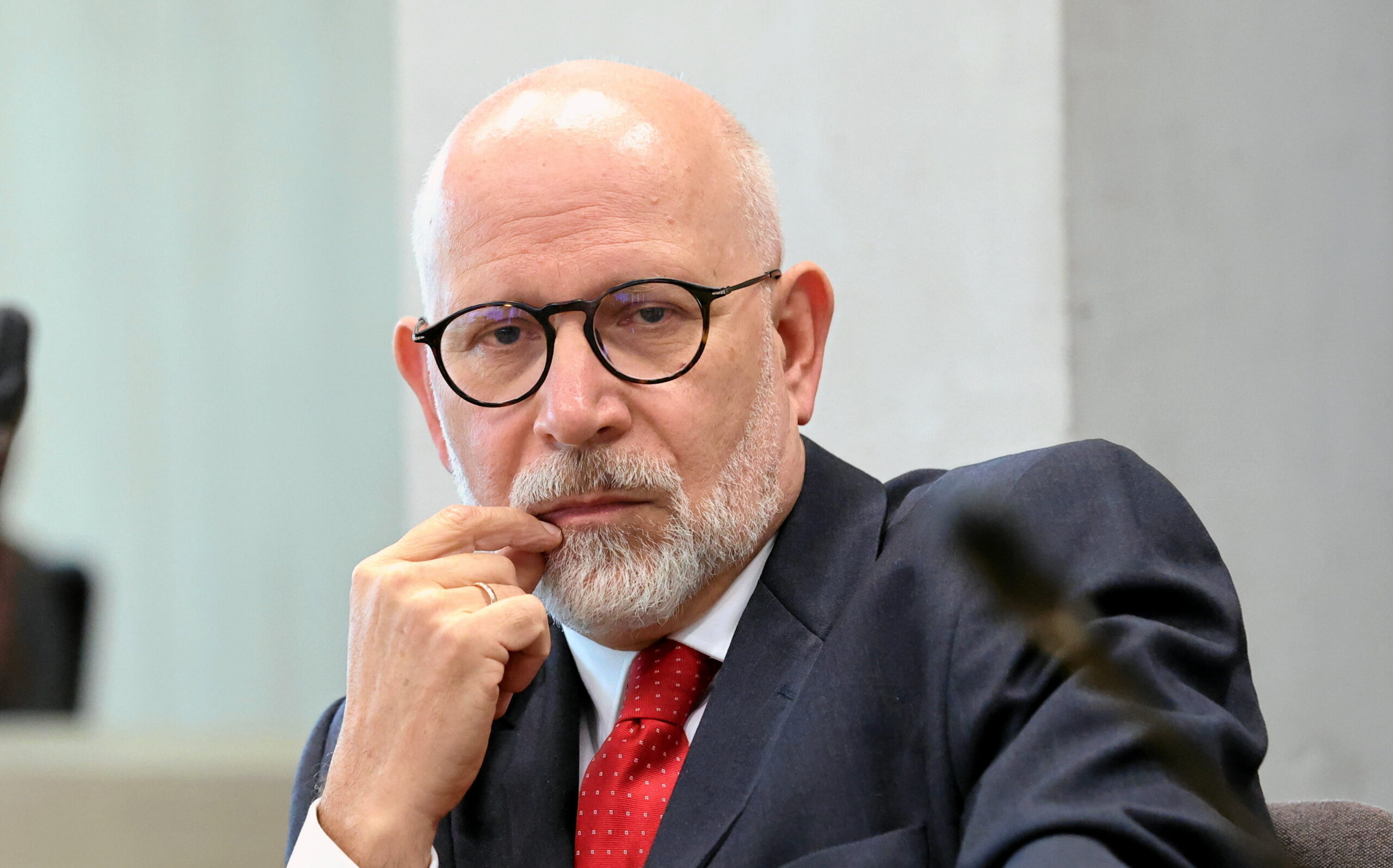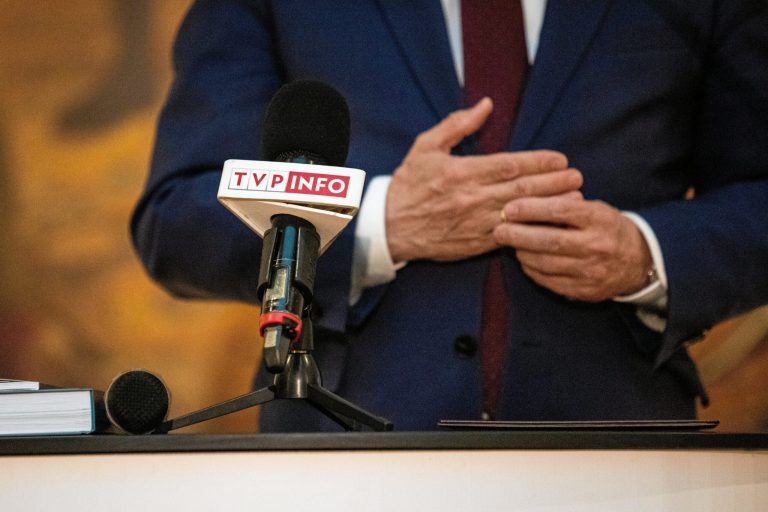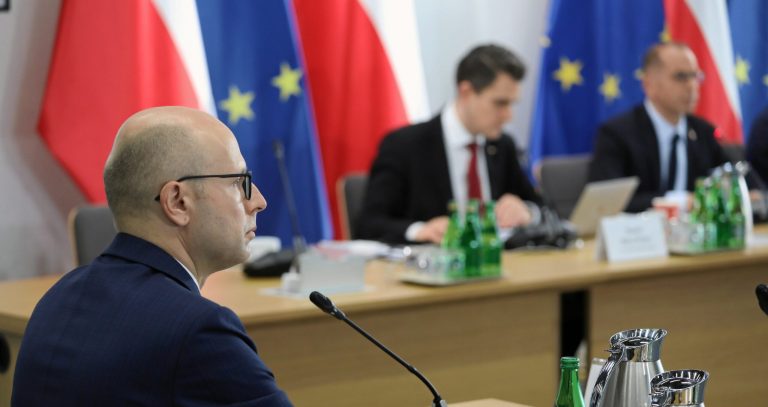Polish government seeks to put broadcaster regulator on trial

Poland’s ruling coalition has begun the process of putting the head of the broadcasting regular, an appointee of the former Law and Justice (PiS) government, on trial.
They accuse Maciej Świrski, an outspoken conservative figure who has led the National Broadcasting Council (KRRiT) since 2022, of impartial and politically motivated decisions against private media he perceived as hostile to PiS and of withholding money from public media after the new government took office.
In response, Świrski has decried the move to bring him before the State Tribunal, a body empowered to punish the highest officials of the state, as “an attempt to intimidate a constitutional body in order to obtain the executive’s desired actions”.
Maciej Świrski odpowie za naruszenia bezstronności, przekroczenia procedur i niewpłacanie środków należnych mediom publicznym. pic.twitter.com/JauFMBZcTq
— PlatformaObywatelska (@Platforma_org) May 9, 2024
On Thursday, Bartłomiej Sienkiewicz, the outgoing culture minister, announced that the motion against Świrski contained three main accusations. “The first is the absolute violation of the law, of statutes, in failing to pay the money owed to public media,” said the minister.
In January, the KRRiT announced its plans to withhold payments to public media, citing the “legal chaos” caused by the takeover of state-owned media outlets by the new government that replaced PiS in office in December.
Some court decisions have found that Sienkiewicz acted unlawfully in part of that media takeover, though other decisions have gone in his favour.
Speaking yesterday, Sienkiewicz said that, regardless of those legal cases, “it is not [the role of] the KRRiT and Mr Świrski to judge who is or is not in charge of the public media. It [the KRRiT] is supposed to give money to the public media. He [Świrski] is not doing that and that is a violation of the law”.
A court has confirmed the government’s move to put state broadcaster TVP into liquidation in December as part of its efforts to take back control of public media from the former ruling PiS party https://t.co/AYHAwZXO7M
— Notes from Poland 🇵🇱 (@notesfrompoland) April 9, 2024
The second claim against Świrski relates to his actions “towards private media that were treated as hostile by the PiS party”, Sienkiewicz continued. “This was a blatant breach of impartiality and overstepping procedures.”
Under Świrski’s leadership, the KRRiT has been accused of disproportionately targeting media outlets critical of PiS, including broadcasters Radio Zet and TOK FM
In March this year, the KRRiT issued a 550,000 zloty (€128,000) fine against TVN, Poland’s largest private TV station, for an alleged “lack of objectivity and journalistic integrity” in a documentary about purported neglect by Polish Pope John Paul II in dealing with child sex abuse in the Catholic church.
Poland’s broadcasting regulator has fined US-owned station TVN for a „biased and selective” report alleging neglect by Pope John Paul II in dealing with cases of child sex abuse.
TVN condemned the decision as an attempt at „censorship and intimidation” https://t.co/k93VJH7Bwi
— Notes from Poland 🇵🇱 (@notesfrompoland) March 7, 2024
The third accusation is that Świrski has “failed to carry out the statistical work [he] is obliged to do”, said Sienkiewicz. He added that the motion to bring Świrski before the State Tribunal had been signed by MPs from the various members of the current ruling coalition.
Sienkiewicz did not say how many MPs signed the motion, but it has to be signed by at least 115 of the 459 active members of the lower house of parliament, the Sejm, for it to be submitted.
Once submitted, such a motion is assessed by the Sejm’s constitutional accountability committee, where the ruling coalition has a majority. It can choose either to discontinue proceedings or to propose bringing Świrski before the State Tribunal.
In the latter case, the Sejm – where the ruling coalition also has a majority – holds a vote in which an absolute majority is required to put Świrski on trial. The State Tribunal can impose penalties such as loss of office, prohibition from holding positions in public bodies, and loss of electoral rights.
Poland’s ruling coalition has submitted a motion to put the central bank’s governor on trial.
They accuse him of breaking several laws and of violating his obligation to uphold the bank’s political independence during the rule of the former PiS government https://t.co/3hES72tZlp
— Notes from Poland 🇵🇱 (@notesfrompoland) March 26, 2024
No official has been brought before the State Tribunal since 2005. But in March this year, another motion was submitted to the Sejm by the ruling coalition to put central bank governor Adam Glapiński – a close associate of PiS chairman Jarosław Kaczyński – on trial.
After news of the motion to bring him before the State Tribunal first emerged, Świrski mocked the move, writing on X that ”at last something is happening”.
“In all seriousness, this is another attempt to intimidate a constitutional body in order to obtain the actions of the body desired by the executive,” he continued, adding that such actions against constitutional bodies are a criminal offence in Poland.
Wreszcie coś się dzieje bo było już nudno, tylko te koncesje i koncesje 😉
A na poważnie – mamy do czynienia z kolejną próbą zastraszania organu konstytucyjnego w celu uzyskania pożądanych przez władzę wykonawczą dzialań organu, czyli przestępstwo opisane w artykule 128 par 3.… https://t.co/oGJcYng6R9 pic.twitter.com/LUXd5iI9u4
— Maciej Świrski (@Maciej_Swirski) May 9, 2024
Meanwhile, former PiS Prime Minister Mateusz Morawiecki, under whose rule Świrski was appointed, said that the attempt to put him on trial was part of the new ruling coalition’s desire to monopolise power.
“Maciej Świrski, a great Polish patriot, is an independent council who seeks to objectively monitor the media market,” Morawiecki told reporters yesterday.
During PiS’s eight years in office, Poland fell from its highest-ever position of 18th in the annual World Press Freedom Index compiled by Reporters Without Borders to its lowest-ever position of 66th.
Poland has again reached its lowest ever position in the World Press Freedom Index compiled by Reporters Without Borders.
It has fallen in the ranking every year since 2015, when it achieved a record high of 18th, hitting a new low of 66th this yearhttps://t.co/e9VeXHZfh6
— Notes from Poland 🇵🇱 (@notesfrompoland) May 4, 2022
Wreszcie coś się dzieje bo było już nudno, tylko te koncesje i koncesje 😉
A na poważnie – mamy do czynienia z kolejną próbą zastraszania organu konstytucyjnego w celu uzyskania pożądanych przez władzę wykonawczą dzialań organu, czyli przestępstwo opisane w artykule 128 par 3.… https://t.co/oGJcYng6R9 pic.twitter.com/LUXd5iI9u4
— Maciej Świrski (@Maciej_Swirski) May 9, 2024
Main image credit: Kuba Atys / Agencja Wyborcza.pl

Alicja Ptak is senior editor at Notes from Poland and a multimedia journalist. She previously worked for Reuters.






